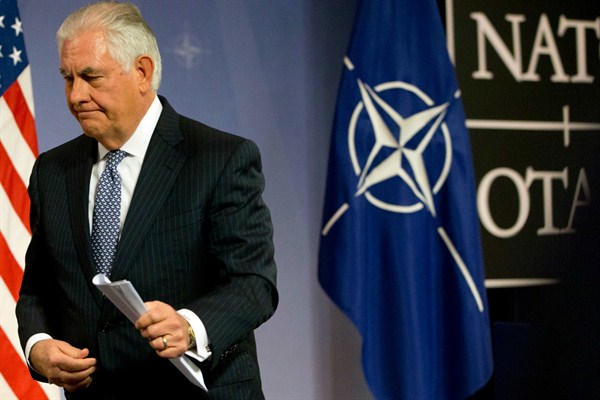The month of November saw a marked increase in the phenomenon known in Japan as “ghost ships”—North Korean fishing vessels that wash ashore or into Japanese waters, often empty or filled with the remains of deceased sailors. It seems like a fitting image for a visit taking place half the world away in Brussels, where U.S. Secretary of State Rex Tillerson arrived yesterday for a European trip that will see him continue on to Austria and France.
The parallels apply on a number of levels. Tillerson himself has been considered the political equivalent of a dead man walking—rumored to be unhappy with his boss and his job, and on his way out of the Trump administration—since at least this past summer. More recently, it was widely reported this week that the White House planned to replace him imminently with current CIA Director Mike Pompeo. Those reports were subsequently denied, but it seems reasonable to assume that Tillerson’s days in the Cabinet are numbered.
The institution he heads, the State Department, has also become a hollowed-out shell of its former self, with high-level posts unfilled and senior foreign service officers reportedly leaving in droves due to crumbling morale. As if to illustrate the problem, the U.S. currently has no ambassador to either Belgium or the European Union to welcome Tillerson to Brussels. Tillerson gamely portrays the devastation as part of a planned reorganization process, but it seems more accurate to say the State Department is being slowly euthanized due to what amounts to sheer arrogance: President Donald Trump has stated he has no need for its expertise, and Tillerson has done little to suggest he feels differently. It’s hard to imagine Tillerson countenancing any high-level executives at ExxonMobil, the global oil giant he headed before entering government service, conducting sensitive negotiations without the benefit of deep and experienced regional experts to guide and inform their decisions. Yet that is apparently how he sees fit to conduct U.S. diplomacy.

